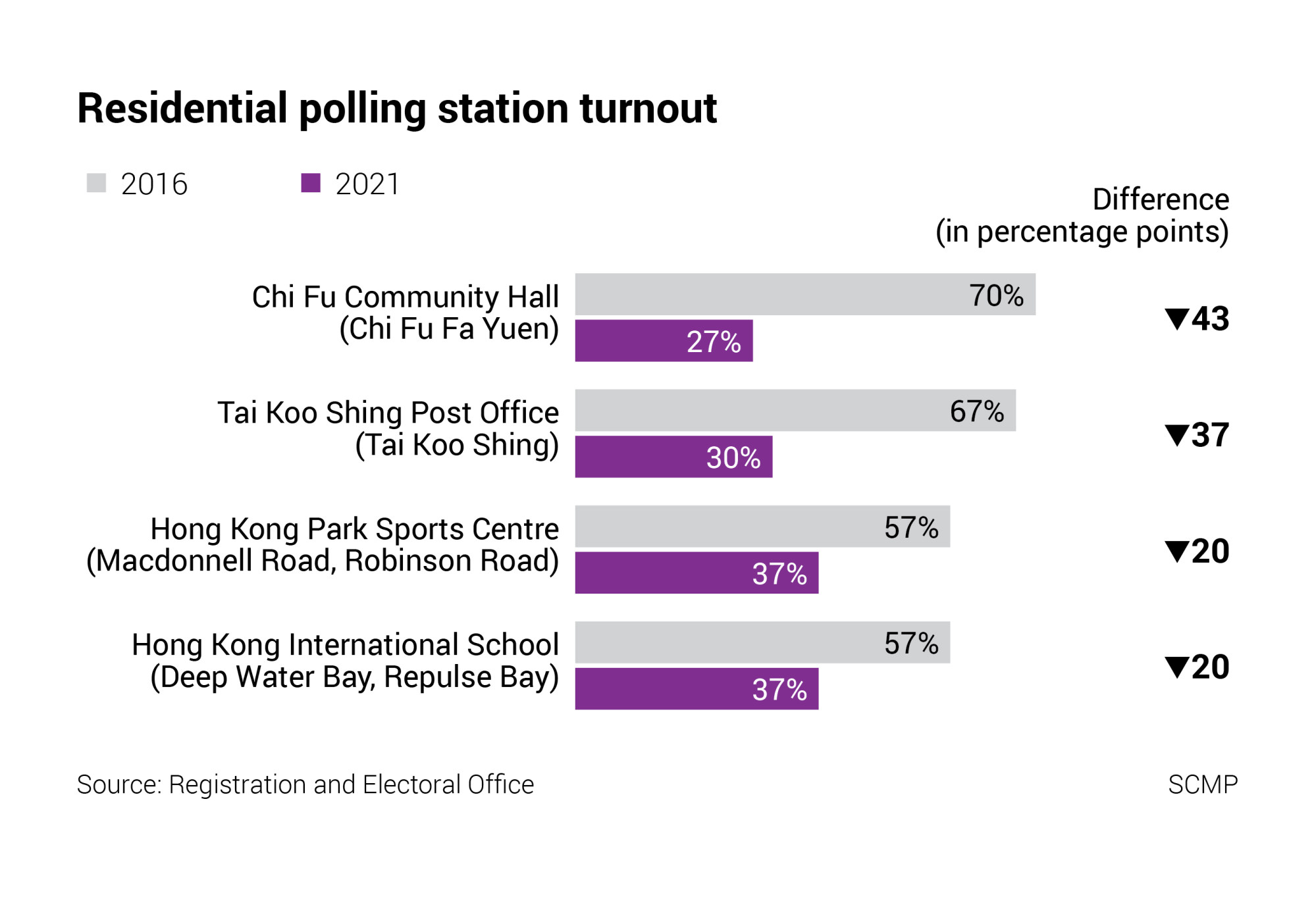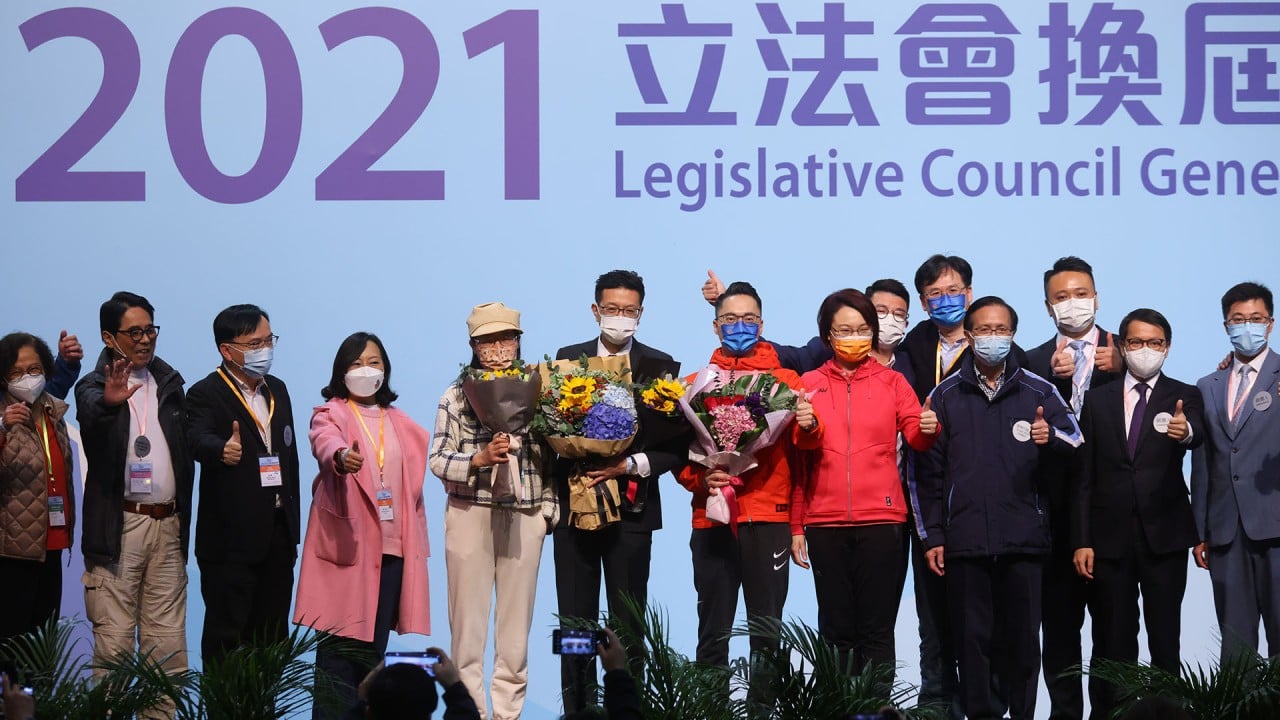
Hong Kong’s middle-class voters snubbed Sunday’s Legco polls, with turnout plunge sharpest in their neighbourhoods
- Voter turnout for Legislative Council poll collapses in traditional heartlands of opposition camp
- Ballots cast at polling stations in middle-class areas down by up to 42 percentage points
By contrast, upper-class residential areas and rural counties which are heavily controlled by the pro-establishment bloc, appeared to be more stable and less overwhelmed by voter disaffection in the city after the political turmoil of the past two years.
Beijing, Hong Kong authorities hit back at foreign critics of Legco election
All 11 centrist or moderate aspirants running for a direct seat in the geographical constituencies were defeated with wide margins, as the mainstream opposition parties snubbed the race, arguing it was designed to stifle dissent.
In Hong Kong Island, for instance, the Chi Fu Fa Yuen polling station in Pok Fu Lam recorded a decline of 43 percentage points, down from 2016’s 70 per cent to 27 per cent.
The three stations in Tai Koo Shing all saw a decline of 32 to 38 percentage points in the voter turnout, compared with five years ago.
At the polling station set up at Tai Koo Shing Post Office, only 1,049 voters cast their ballots on Sunday, down by 69 per cent from 2016’s 3,333.
Over in Kowloon, the voter turnout at the polling station in Lai Chi Kok Community Hall, which covers four major middle-class residences including Liberte and the Pacifica, also dropped from 66 per cent to 28 per cent, marking a decline of 38 percentage points.
But the picture was far less bleak at polling stations covering The Peak and Deep Water Bay – both well-off residential areas – as they experienced a drop in turnout of only around 20 percentage points.

Districts in which opposition candidates previously won with wide margins also witnessed a sharp decline in turnout, as voters stayed away given that hopefuls aligned with their political views were not in the race.
In Tuen Mun, the polling stations set up at YCH Ho Sik Nam Primary School, near Yau Oi Estate, as well as PLK Women’s Welfare Club Western District Fung Lee Pui Yiu Primary School, which covers the middle-class residences such as Aegean Coast, marked a drop in voter turnout by 31 percentage points and 29 percentage points respectively.
In the 2019 district council election, opposition candidates Lam Ming-yan and Beatrice Chu Shun-nga scored massively at the two polling stations, beating their rivals by more than 63 per cent of votes.
Significantly, moderate Legco hopefuls, who were also district councillors, appeared to have lost their support base in their own constituencies in this election.
In the polling station at HKFEW Wong Cho Bau School in Tung Chung, only 1,735 voters cast their ballots on Sunday, down by 69 per cent from the 5,523 in 2016. The voter turnout rate went down 24 percentage points.
In 2019, 5,376 voters at that polling station chose Fong Lung-fei as their district councillor. But on Sunday, Fong, who eyed a Legco seat via the Hong Kong Island West constituency, received only 372 votes at that particular venue. His pro-establishment rivals Regina Ip Lau Suk-yee and Chan Hok-fung bagged 960 and 403 votes respectively.
Adrian Lau Cheuk-yu, running in New Territories South West, also suffered the same fate. Lau was elected district councillor via the Discovery Park constituency with 4,498 votes in 2019. On Sunday, he bagged only 668 votes in the same polling station in Tsuen King Circuit Sports Centre, fewer than half of his two pro-Beijing rivals who each received over 1,300 votes.
How serious is Beijing about universal suffrage in Hong Kong?
Lau said the middle class had always been staunch supporters of the pro-democracy camp and many had now become disillusioned with the city’s situation.
“They are those who have the greatest ability to move out of the city anytime and many of them thus do not have much incentive to cast their votes in a bid to make a change,” he said.
Wealthier people were not affected by this sentiment as most of them had business dealings or connections with the mainland, he argued.
Lau also said he was already very grateful that he received more than 600 votes in his constituency. “They may not agree with my decision to run, but they acknowledged my work as a district councillor. These are my iron votes,” he said.
A source from the opposition camp, who spoke on condition of anonymity, said the findings showed that their supporters did not agree with the moderates’ decision to participate in the revamped decision.
Political scientist Ivan Choy Chi-keung, of Chinese University, said going by the votes received by moderates, only around 7 per cent of pro-democracy supporters could be assumed to have cast their ballots on Sunday, compared with 2016. By contrast, the total votes the pro-establishment bloc got increased by 40 per cent this time.
“It is an overall phenomenon that the supporters of the opposition bloc had refused to participate in this Legco election. They are either not convinced by the so-called moderate approach, or they despise the performance of former lawmakers who are running,” he said, referring to candidates such as Frederick Fung Kin-kee and Nelson Wong Sing-chi.
“Middle-class residents perhaps are those who are the most disappointed in the current system,” he added.
Pro-establishment camp makes nearly clean sweep in Hong Kong’s Legco poll
But pro-establishment veteran Maria Tam Wai-chu, vice-chairwoman of the Basic Law Committee, described the overall turnout of 30 per cent as a decent figure and well within expectations given the latest Covid-19 pandemic situation, with the emergence of Omicron variant cases.
Still, Tam said she was surprised most supporters of the pro-democracy camp did not vote on Sunday. Asked if there was a need to revamp the electoral system, she said: “We should first analyse the reasons behind the low turnout and why voters are not coming out.”
Reform should only take place after the newly elected lawmakers had completed their four-year term, allowing people’s trust in them to deepen, she added.



